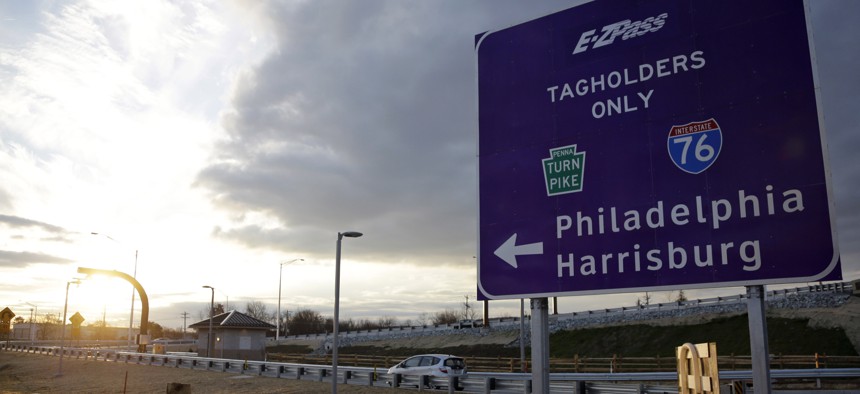Turnpike Fees are Constitutional, Appeals Court Rules

In this file photo taken Dec. 11, 2012, a driver enters the Pennsylvania Turnpike at a newly completed E-ZPass Only electronic interchange in Malvern, Pa. AP Photo/Matt Slocum

Connecting state and local government leaders
A federal appeals court found the Pennsylvania Turnpike Commission was within its rights to use toll fees for purposes other than upkeep of the highway.
High tolls on the Pennsylvania Turnpike do not violate the Constitution, the U.S. 3rd Circuit Court of Appeals ruled this week in decision that quashed truckers’ attempt to recoup nearly $6 billion in tolls.
Fees to drive all the way across Pennsylvania on the turnpike range from $36.20 for a passenger car to almost $1,400 for the heaviest of trucks. The Pennsylvania Turnpike Commission collects more in tolls than it takes to maintain the roadways and provides about $450 million in annual excess revenue to the Pennsylvania Department of Transportation to pay for public transit projects.
In challenging use of the toll money on other projects, the Owner Operator Independent Drivers Association Inc. and the National Motorists Association sued the commission and asked for nearly $6 billion in fees to be refunded.
The motorist groups alleged that the fees were a violation of the Commerce Clause of the Constitution, which stipulates that states cannot excessively burden interstate commerce.
A lower court rejected the premise and dismissed the lawsuit. This week’s decision by the Philadelphia-based 3rd Circuit upheld that decision.
The three-judge panel found that the commission was within its rights to use the toll fees for purposes other than upkeep of the turnpike and that the truckers could not prove interstate commerce had been deterred by the fees.
“Because Congress has permitted state authorities, such as Defendants, to use the tolls for non-Turnpike purposes, the collection and use of the tolls do not implicate the Commerce Clause,” wrote U.S. Circuit Judge Patty Shwartz in the 24-page opinion.
Further, she wrote, the truckers “allege only that the increased tolls have caused and will continue to cause Turnpike users to switch to non-toll roads in the future, and not that interstate or intrastate travel has been or will be deterred, they have not stated a claim that their right to travel has been infringed.”
A spokeswoman for the Owner Operator Independent Drivers Association said the group was considering next steps in the case.
“We are certainly disappointed but do not concede that the court got it right and we will continue to review our options,” said association spokeswoman Norita Taylor in an email.
A ruling in favor of the motorist groups could have had a detrimental impact on Pennsylvania’s transit funding. The turnpike commission has given the Pennsylvania Department of Transportation $4.6 billion since 2007 to pay for public transit projects. The Southeastern Pennsylvania Transportation Authority (SEPTA) receives $232 million annually in turnpike fees. The Philadelphia Inquirer reported earlier this year that the authority put 37 projects on hold over uncertainty about funding as a result of the lawsuit.
“We are pleased that the lawsuit against the turnpike that threatened SEPTA’s capital funding has been dismissed," Pasquale “Pat” Deon, SEPTA’s board chairman and a member of the Turnpike Commission told the Philadelphia Inquirer this week. “The investments the state has made in transportation infrastructure have proven to pay dividends by driving economic growth in Southeast Pennsylvania and throughout the commonwealth.”
Turnpike fees have been on the rise in Pennsylvania since a law mandating payments to the state transportation department was signed into law in 2007. The motorist groups alleged in their lawsuit that tolls had increased more than 200% since then.
About half of the turnpike’s fiscal 2020 revenues will go toward debt service payments, according to a recent commission statement that announced the next round of toll increases. Tolls are set to increase by 6% beginning in January.
Andrea Noble is a staff correspondent for Route Fifty.

NEXT STORY: Shifting needs drive data center decisions




